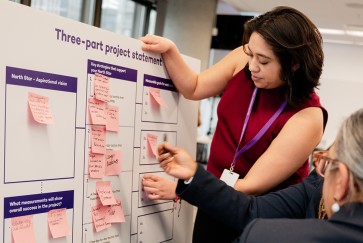Northwestern University anthropologists Katherine Amato and Thomas McDade have received Manulife CIFAR Population Health & Well-being Grants for COVID-19-related population health projects, enabling interdisciplinary research on social, cognitive and biological implications of the pandemic.
The grant program is funding six interdisciplinary project teams that push traditional research boundaries and offer new insight into the effects of the pandemic.
Amato, an assistant professor of anthropology in the Weinberg College of Arts and Sciences, will examine how responses to COVID-19 will affect infants’ microbiomes in the project, “The influence of COVID-19 behavioral responses on early life microbial exposures,” along with Canadian Institute for Advanced Research (CIFAR) fellows/collaborators from the University of Manitoba, Rutgers University and the University of Delaware.
This interdisciplinary study will integrate microbiome and social science research to explore how variation in behavioral responses to COVID-19 influence the infant microbiome. The project will lay the foundation for a larger future study, including the collection of “post-pandemic” samples for comparison to the ones collected in this pilot study. Anthropology doctoral candidate Melissa Manus will play a large role in driving the project, and sample collection will happen in collaboration with Dr. Emily Miller at Feinberg.
McDade, a professor of anthropology and a faculty fellow with the University’s Institute for Policy Research, will examine how the pandemic will affect children’s ability to thrive in the project, “A bio-ecological integrative approach to understand the ‘hidden costs’ of COVID-19 on children,” along with CIFAR fellows/collaborators from the University of British Columbia, Duke University, University of Toronto/Sick Kids/Vector Institute, University of Manitoba, University of Minnesota, Columbia University, University of California Irvine and Western University.
The interdisciplinary team will integrate biological, behavioral and sociological data to assess the long-term effects of the pandemic on children. In order to do this, they will first develop an approach to link datasets about epigenetics, the microbiome, immune-markers and functional genomics of immune-response with administrative databases. Then, they will create and distribute “at home” kits for citizen scientists to contribute these various types of data. These activities will enable the measurement, evaluation and long-term follow-up of the “COVID-19 experience” on children at a population level.
“These projects build on decades of partnership between CIFAR and Manulife on population health,” said Dr. Alan Bernstein, O.C., CIFAR president and CEO. “From the long-term effects of COVID-19 on infant microbiomes, on the developing brain and on child health, to the impact of the global pandemic on our social networks and well-being, they address questions that are crucial to understanding the full impacts of the pandemic.”
CIFAR is a Canadian-based global research organization that convenes extraordinary minds to address the most important questions facing science and humanity. It is supported by the governments of Canada, British Columbia, Alberta and Quebec, Canadian and international partners, as well as individuals, foundations and corporations.

